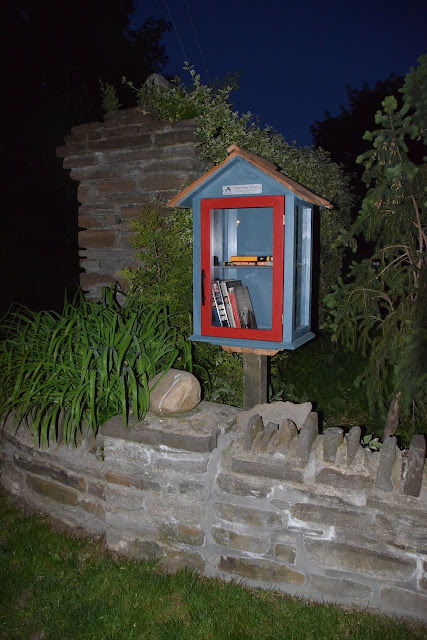Monday, May 29, 2023
Little free library
Ross and Laurie (beside Denison Park at Lippincott) have set up this very nice "little free library" box in a corner of their place. I should be able to donate a few books from my own mostly-reference library. Not everyone thinks that these things are a good idea.
Friday, May 19, 2023
Agent orange
This late-evening marauder comes as close to being "orange" (especially in the tail) as one might deem possible. Close inspection suggests that the effect might just be a whitened mixture of "brown". A search finds that the descriptive word for it is "erythrism". This particular raccoon paced our back- and side-yards for a half-hour or so before finally climbing the fence into a neighbour's yard. This included ventures onto the back deck and peering into the kitchen door. When I went out in order to scare it away, it was somewhat unconcerned by my approach — perhaps even attracted to it — as though it was tame. This leads me to suppose that it might be suffering from distemper.
Update: Two days later it was on its way to be euthanized...
Friday, May 12, 2023
A million-digit Leyland prime (ryanp)
Ryan Propper ("ryanp" on Mersenne forum) had not contributed any Leyland primes prior to Wednesday, when he proclaimed this 1433792-digit integer to be a PRP. Then yesterday, he added another (at a mere 582101 digits) that had a small y [L(x,y) defines a Leyland integer as x^y+y^x, x≥y; here y=2]. The current top-five Leyland prime leaderboard now sports three million-digit Leyland primes (the first column is the number of digits):
1433792 (300102,59935) Ryan Propper May 2023
1000175 (218767,37314) Gabor Levai Mar 2023
1000027 (211185,54364) Gabor Levai May 2022
582101 (1933695,2) Ryan Propper May 2023
506429 (107890,49423) Miklos Levai Feb 2022
Tuesday, May 09, 2023
A million-digit Leyland prime (ramp-up)
This is an update to my previous "retry" post, wherein I announced a new million-digit Leyland prime search attempt. Today I finished ramping up the search from the initial 12 processes on 3 computers (covering 20% of the search space) to 57 processes on 18 computers (covering about 70% of the search space). My search last year had the same 18 machines doing 108 processes but I subsequently discovered that this overloading of processes was highly inefficient and detrimental to the effort. My current 57 processes should all be done (roughly) in early November and I can assign the remaining 30% of the search space — process by process, as they come due — at that time.
Subscribe to:
Posts (Atom)


